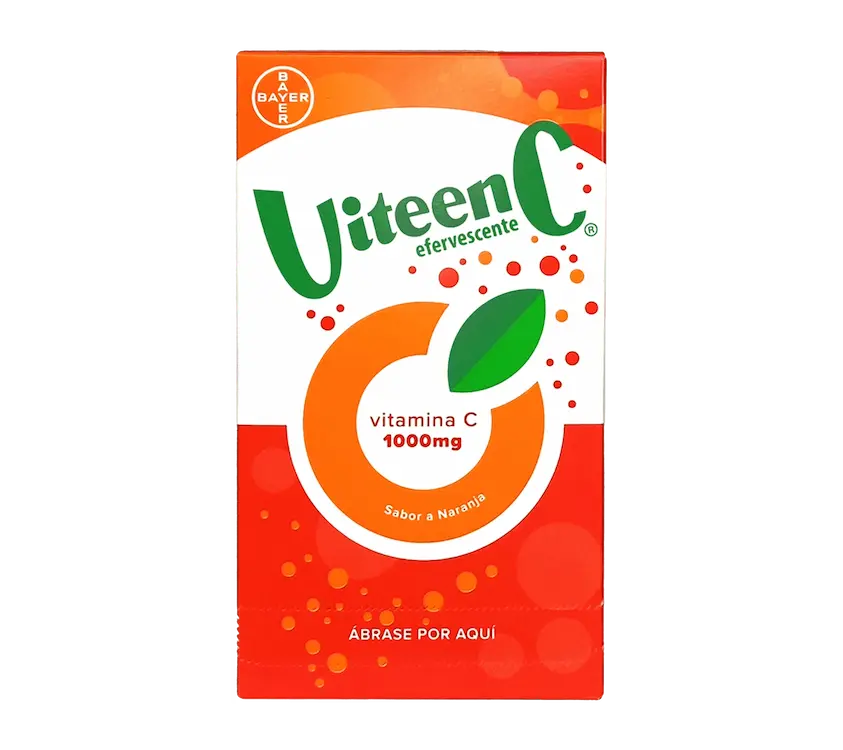Viteen c (500 mg/1000 mg): Usage, Risks And Side Effects
Viteen c is an effervescent tablet containing vitamin C.
Available in 500 mg and 1000 mg presentations.
It is used in case of vitamin C deficiency.
Since it is vitamin C, it is generally safe to use (in safe doses).

What Will We Learn?
What Is Vitamin C?
Vitamin C (ascorbic acid) contained in the medicine is a nutrient your body needs to create collagen in cartilage, muscle vessels, muscles and bones.
This vitamin is very important in your body’s recovery time.
The vitamin C in the drug is an antioxidant that helps protect your cells against the effects of free radicals (molecules produced when your body breaks down food and is exposed to radiation from the sun, tobacco smoke, X-rays, or other sources).
Free radicals may play a role in cancer, heart disease and other diseases.
Vitamin C also helps your body store and absorb iron.
Your body cannot produce vitamin C itself.
Therefore, we get vitamin C from foods such as citrus fruits, fruits, potatoes, tomatoes, peppers, cabbage, Brussels sprouts, broccoli and spinach.
In case of vitamin C deficiency, doctors can also prescribe nutritional supplements such as Viteen c.
People listed below are more likely to have vitamin C deficiency:
- Smoking or exposure to cigarette smoke
- People with certain cancers or certain gastrointestinal conditions
- People who do not consume vegetables or fruits regularly
Severe vitamin C deficiency can lead to a disease called scurvy, which causes bleeding gums, anemia, bruising and delayed wound healing.
If you’ve taken a vitamin C tablet for its antioxidant properties, be aware that this supplement may not offer the same benefits as antioxidants naturally found in foods.
The recommended daily amount of vitamin C is 75 milligrams for adult women and 90 milligrams for adult men.
Things To Know About Vitamin C
- Cancer. Scientific research shows that a diet rich in fruits and vegetables can reduce your risk of many types of cancer, such as colon, breast and lung cancer. Taking tablets or other supplements containing vitamin C by mouth does not seem to provide the same benefit.
- Flu, cold. Research shows that taking oral vitamin C supplements does not prevent colds. Scientific studies also show that the benefits of regularly taking vitamin C supplements to reduce the duration or severity of colds are minimal.
- Eye diseases. Taking vitamin C and other vitamins by mouth seems to prevent worsening of age-related macular degeneration (AMD). Scientific research has revealed that people with higher levels of vitamin C in their diets have a lower risk of developing cataracts.
If you cannot get enough vitamin C in your diet, you can use vitamin C supplements in normal doses.
How To Use Viteen c?
If Viteen c is to be used in the elderly and children, a doctor should be consulted.
Dissolve the tablet (1000 mg or 500 mg), depending on the package presentation, in half a glass of warm water.
The usual dose for adults is one or 2 tablets of 500 mg or one tablet of 1000 mg.
Be careful not to exceed the daily dose of 1000 mg.
What Are The Side Effects Of Viteen C?
Viteen c taken by mouth is generally considered safe when taken in appropriate doses.
Taking too many Viteen c tablets may cause side effects including:
- Diarrhea, nausea, vomiting
- Painful burning sensation in the chest
- Stomach cramps or bloating
- Fatigue and sleepiness or sometimes insomnia
- Headache
- Skin flushing
The side effects listed above are not a complete list.
If any of these side effects occur, this should be discussed with the doctor.
Our article about Cafiaspirina 500 mg may also attract your attention.
